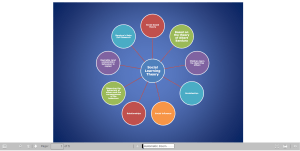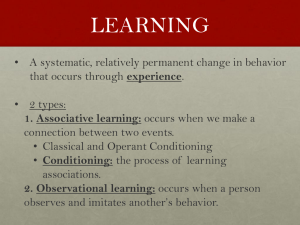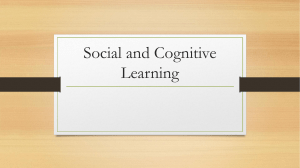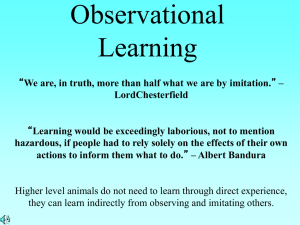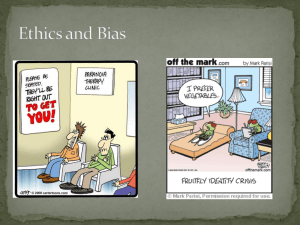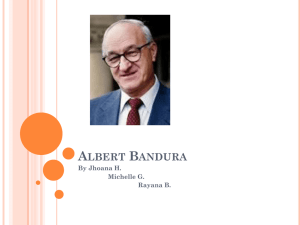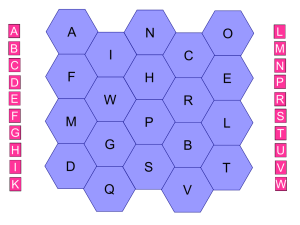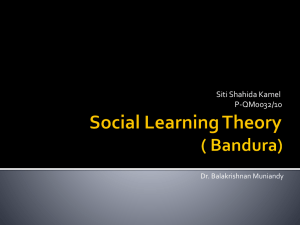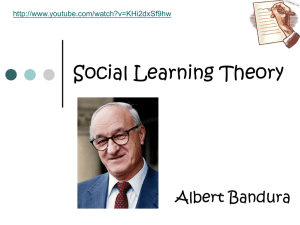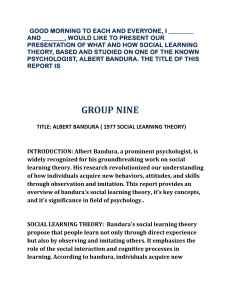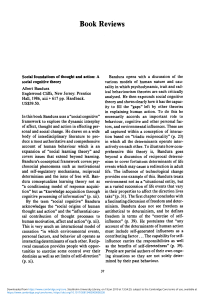Social Learning Theory of Personality: Bandura's Model
advertisement
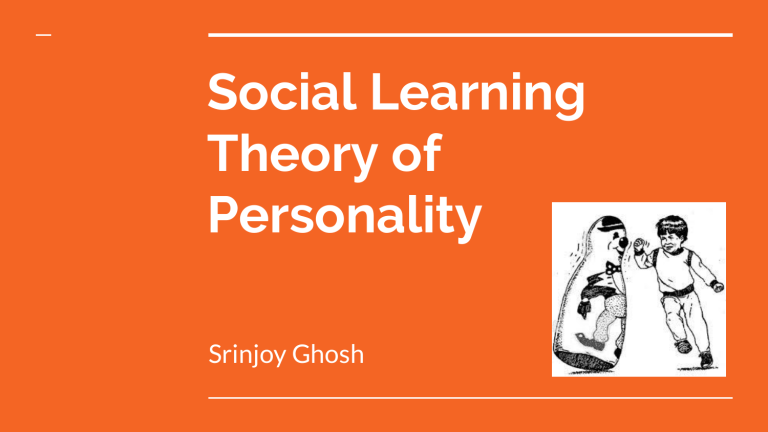
Social Learning Theory of Personality Srinjoy Ghosh Mind Jog How much does the environment influence our behaviour? How much do we influence the environment? Personal Connect Think about the questions below and discuss: ➔ Do you have fear of snakes? ➔ Is this fear a part of your personality? Is this fear learnt from the environment? ➔ Is it possible to control this fear? Meet Albert Bandura Professor of Psychology at Stanford University Proposed the famous theory of Social Learning The theory provides a framework for understanding how people actively shape and are shaped by their environment. ARE AGGRESSION AND VIOLENCE LEARNED BEHAVIOURS? In a famous and influential experiment known as the Bobo doll experiment, Albert Bandura and his colleagues demonstrated one way that children learn aggression. The Bobo Experiment Participants would observe an adult behaving in a violent manner towards a Bobo doll toy. The toys, which were popular during the 1960s, feature an image of a clown and were designed to Children in one of these groups were placed in a room in which they witnessed an adult hitting a Bobo doll in an aggressive manner. They were later given the opportunity to play with the dolls for themselves. Results ➔ the group of children who had observed an adult behaving violently towards the toy were more likely to act aggressively towards it themselves when given the opportunity. ➔ learning takes place not only when individuals are rewarded or punished for their own behavior, but also when they observe another person called observational learning. Now let us watch the experiment CONCLUSION Social Learning impacts learning, thought and behaviour Involves an individual observing behaviour of people around them Children imitate behaviours of adults Seeing others being rewarded or punished leads to evaluation of one’s own behaviour. Vicarious learning also known as observational learning or learning through modeling occurs when an individual learns something simply through observation without direct reinforcement or punishment of the behavior, i.e., vicariously Example Learning to whistle after watching someone else shape their lips and expel air is an example of Vicarious learning. The component processes underlying observational learning are: (1) Attention: The extent to which we are exposed/notice the behavior. For a behavior to be imitated, it has to grab our attention. We observe many behaviors on a daily basis, and many of these are not noteworthy. (2) Retention: How well the behavior is remembered. The behavior may be noticed but is it not always remembered which obviously prevents imitation. (3) Motor Reproduction: This is the ability to perform the behavior that the model has just demonstrated. We see much behavior on a daily basis that we would like to be able to imitate but that this not always possible. (4) Motivation: The will to perform the behavior. The rewards and punishment that follow a behavior will be considered by the observer. Self Efficacy ● The term self-efficacy refers to an individual's confidence in their ability to complete a task or achieve a goal. The concept was originally developed by Albert Bandura. ● According to Bandura, there are two factors that influence whether or not someone engages in a particular behavior: outcome expectancy and selfefficacy. ● In other words, our ability to achieve a goal or complete a task depends on whether we think we can do it (self-efficacy), and whether we think it will have good results (outcome expectancy). Reciprocal Determinism Bandura believed in “reciprocal determinism”, that is, the world and a person’s behavior cause each other. Bandura soon considered personality as an interaction between three components: the environment, behavior, and one’s psychological processes (one’s ability to entertain images in minds and language). We also make judgments about our own capabilities by watching others. Self Efficacy & Observation Our self-efficacy for a given activity is more likely to increase when we see someone else succeed at that activity through hard work, rather than natural ability. Think: How our role models have helped us in our self-efficacy? Good luck!
